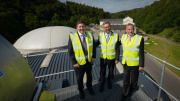 Scotland Office Minister Lord Dunlop toasted the future of Scotch Whisky as he met apprentices and toured a distillery at the cutting- edge of the industry’s renewable energy revolution.
Scotland Office Minister Lord Dunlop toasted the future of Scotch Whisky as he met apprentices and toured a distillery at the cutting- edge of the industry’s renewable energy revolution.
Lord Dunlop met a group of Diageo engineering apprentices at the company’s Glendullan Distillery in Speyside where they are forging careers at the heart of the global Scotch Whisky industry. Glendullan is also the location of a recently completed £12m bio energy plant which powers the distillery with sustainable energy.
The Minister welcomed Diageo’s investment in creating apprenticeship opportunities and for leading the drive for environmental sustainability in the industry.
He said: “This was an excellent opportunity to see at firsthand how Diageo is planning for the future – Its apprenticeship scheme will train the engineers the Scotch whisky industry needs in order to maintain its place as one of Scotland’s – and the UK’s – great success stories.
“The commitment to powering distilleries like Glendullan with sustainable energy – recycled from the co-products of the whisky-making process – is also exactly the right thing to do. Good for the planet, good for the whisky industry and good for the Scottish economy.”
Keith Miller, Diageo’s distillation and maturation director, said: “Our apprentices are the future of the industry and we’re delighted to be creating these opportunities in Speyside.
“We’re also very proud of our record in investing in cutting-edge sustainable technology at our distilleries. The bioenergy plant at Glendullan is the most recent example of how we use innovative technology which harnesses the potential of the natural raw materials we use in the distillation process to generate renewable energy.
“We believe that our investments in the future talent and in environmental sustainability are equally important in setting the industry up for a successful future here in Scotland.”
Jordan Conti, 23, a fourth year mechanical engineering apprentice who met Lord Dunlop, said: “It is great to be part of such an exciting global industry, particularly here in Speyside which has more whisky distilleries than any other part of Scotland. The opportunity I’ve had over the past four years to serve my apprenticeship and to learn about distilling and also about the engineering behind renewable energy is fantastic.”
Diageo has 72 apprentices in its business in Scotland, ranging from engineers in distilleries and packaging plants, to apprentice cooper and coppersmiths learning the age-old craft trades of the industry.
The new £12m bio energy plant at Glendullan Distillery represents the latest phase in an on-going programme which has seen Diageo invest over £100m in renewable energy projects at its distilleries over recent years.
The Glendullan plant, which was built in partnership with leading-edge British renewable energy company Clearfleau, takes the natural co-products from distillation and converts them into biogas using an anaerobic digestion process. The biogas is then utilised to raise steam to drive the distillery whilst clean water is returned to the environment.
The plant has reduced the carbon foot print of the distillery by around 2,000 tonnes of CO2 per year – the equivalent to removing 740 cars from the road.
Earlier this week the Glendullan bioenergy project was shortlisted in two categories at the prestigious Vision in Business for the Environment of Scotland Awards.
Craig Chapman, CEO of Clearfleau, said; “This project, a result of close collaboration between Diageo and Clearfleau, shows how British technology can enable a traditional but energy intensive Scottish business sector to embrace the circular economy, reduce its costs and create a more sustainable basis for production.”
As part of the bioenergy plant project, Diageo also invested in a new pipeline to link three distilleries in the Dufftown area – Mortlach Distillery, Dufftown Distillery and Glendullan Distillery – to the bio energy plant reducing the need to move liquid co-products by tanker, and resulting in a reduction in the number of heavy goods vehicles on local roads by around 11 tankers per day.



